- Home
- Donald Hamilton
The Wrecking Crew Page 17
The Wrecking Crew Read online
Page 17
“Thanks,” I said. “May I ask how you figure in all this, Cousin Elin?”
“Why,” she said calmly, “I am the person who was to get the films from you, perhaps on the train or plane going south. You did not know we were to travel south together, did you? But it would not have been too difficult to arrange, I think. You did not find me unattractive. Or if not then, I would have taken them in Stockholm, or at Torsäter… That was before you suddenly decided to ship them off to America and we had to change our plans.”
I was thinking that I should have known. Lou had tried to warn me, for one thing. And then there was the fact that last night, after learning what I planned to do with the films, Lou must have passed the word to somebody. Yet she had not been out of my sight all evening; she’d hardly been out of my hearing, except once at the dinner party when she’d been talking to Elin…
I looked at the girl before me. “Just out of curiosity, is there really such a person as Colonel Stjernhjelm, or did you make him up? And are we really related?”
She laughed. “Colonel Stjernhjelm certainly does exist; he would be indignant to hear that you doubted it. I went to considerable trouble to make his acquaintance. And of course we are related. Sweden is a small country. I do not think there are any of the old families that cannot trace a relationship somewhere.” She looked at me and smiled. “You have a reproachful expression, Cousin Matthias. I deceived you, if not in this respect, in others. Well, did you not try to deceive me, too, pretending to be a nice American photographer who didn’t know a word of Swedish?” She continued to smile, watching me. “Vad gör vi nu?” she asked.
“What do we do now?” I translated. “Why, now we pay a visit to Mister Caselius. Nu gör vi visit hos Herr Caselius.”
She shook her head gently. “You are much too optimistic. Just because you took my gun away from me… I should not have tried to force you with the gun. It was a mistake. I should have followed my instructions, but I found them distasteful. But one cannot be squeamish in this work, can one, Cousin?”
“I’m interested,” I said. “Let’s hear more about your instructions.”
She said, “I will have to put my hand in my pocket. I am not reaching for a weapon. Please do not hit me again.” She didn’t wait for a response, but reached down and came up with a small bundle, which she spread on the table. “I think you will recognize these,” she said.
I looked. There was a wedding ring, a rather nice engagement diamond, a long cigarette holder, and the large linen handkerchief, no longer quite clean and fresh, that I’d lent to Lou Taylor a few hours ago so that she could dry her eyes. My first feeling was relief. Anyway, she was still alive. At least that was what I was supposed to think.
“Yes,” I said. “I recognize them. Where is she?”
“The woman is in our hands. I am to tell you that if the films are not delivered to me, and if I do not appear with them at a certain place within a certain fairly short time, she will die. She will suffer first, and then she will die.”
I looked at her, speaking her bloodthirsty lines with a kind of childish innocence. It was obvious that she didn’t really know what suffering meant, and if she’d ever seen death, it had been neat and tidy, in a setting of sad organ music and lovely flowers. She was playing an exciting game involving dangerous weapons and melodramatic speeches and, no doubt, pure, rebellious motives of one kind or another. She had a Cause, I was sure. They always do. At that age, they’re always saving the world, or some small part of it, from something. I suppose it’s a good thing, in a way, even if it makes them suckers for any sharpie with a fast line of talk. Certainly, if the world ever is saved, it’ll be by somebody young enough not to know that it can’t be done.
As for the threat itself, it was all I could do not to laugh in her face. I mean, they must have been watching TV or something. It was the corny, classic move: grab the heroine and immediately the hero, previously a raging tiger, becomes a little woolly lamb, bleating his concern for his beloved.
I suppose that’s okay for the kids who watch those shows. In real life, it doesn’t work quite like that. I mean, I’d been sent to do a job, and when you send a man like me to do a job you don’t expect him to louse it up any time somebody happens to threaten some stray female he happens to like. Sara Lundgren was dead. She’d had it coming, in a sense; but Vance was dead, too, and he’d been a pretty good man. Others had died, and others were going to die, and if one of them had to be Lou Taylor, it was tough. I’d feel real bad about it, but sentiment is one thing and business is another. I might even have to die myself. I’d feel like hell about that, too.
I started to say something like this, and then I checked myself. After all, it was an opening; it was what I’d been waiting for. Instead, I let my shoulders sag despondently.
“Is she all right?” I asked, looking at the stuff on the table: “He hasn’t hurt her, has he?”
“Not yet,” Elin said. “Where are the films?”
“What assurance do I have—”
“None,” the kid said. “But you do know that if you refuse to cooperate, she will die.”
I looked up. “Elin,” I said, “you talk big about death, but have you ever seen anybody dead? Let me tell you about a woman named Sara Lundgren, killed by your friend Caselius with a machine pistol. She took several bullets in the face, and the rest of the burst in the chest. Have you ever seen a pretty woman dead, with part of her jaw shot away and her brains leaking out of the back of her head—”
Elin made a sharp little gesture. “We’re wasting time!” Her face was pale. “Where are the films?”
I drew a long breath. “All right,” I said resignedly. “All right, but I’m going with you.”
It was the right move. It was the thing I was supposed to say. I saw the faint gleam of triumph in her eyes: my reaction was the one she’d been warned to expect, by Caselius, who’d know that in our business we don’t have families or lovers or friends. He’d know that no threat to Lou would hold me back—she was a grown woman who had to take her own chances—and he expected me to come, wanted me to come, and was ready for me.
Elin said, with a show of surprise: “Do you expect me to lead you to the man you came here to kill? Do you take me for a fool, Cousin Matthias?”
I hesitated. Then I took her little gun from my pocket and laid it on the table. I hesitated again. Then I took my own gun out from where I was wearing it, tucked under my belt on the left side, butt forward. The agents of the F.B.I., those scientific boys, have determined that the best place to pack a small concealed weapon is on the right hip under the coat, high up, in a holster firmly anchored to the belt. You sweep the coat aside and go for the gun in a single movement. This is fine if you like holsters and are quite sure your right hand is going to be available when the time comes. Personally, I’m opposed to carrying a lot of leather gear—if discovered, it makes you look like a gangster—and if I’m going to break down and wear a firearm, I want it where I can reach it with either hand.
I laid the little Smith and Wesson beside the Spanish pistol. “There’s your gun,” I said. “And there’s mine. Where’s the risk? I’m alone. Caselius has at least five men; I met them in Stockholm—”
“No, only two now—” She checked herself quickly, flushing.
I grinned. “Okay. That checks. Two were picked up by the police today, weren’t they, after the shooting here at the hotel? Caselius was kind of slow calling them off, wasn’t he? If they hadn’t shot the wrong man, he’d never have got his films… And then there was the guy last week, shot in the shoulder by my friend Vance. Miracle drugs or no miracle drugs, he’ll be out of commission for a while, won’t he?”
“He’s dead!” Elin said angrily. “Your friend murdered him!”
I said, “I don’t think so. Vance said he shot for the shoulder, and he was a boy who could call his shots. If the man’s dead, which doesn’t grieve me greatly, it’s probably because Caselius couldn’t be bothered patching up a c
ripple, and got rid of him… Okay, so he has two men and you, all armed, against one unarmed man. What kind of odds do you people want, anyway?”
She glanced at me and smiled. “Unarmed, Cousin Matthias? What about your little knife? Caselius says you are quite expert in its use.”
I sighed, with the air of a man caught trying to pull a fast one. I took the Solingen knife from my pocket and laid it beside the little .38—that damn little revolver that we’d gone to so much trouble to get into the country. Well, that was the way it went. You spent weeks providing yourself with arms and explosives, and laid elaborate plans for their use, and then half the time you wound up doing the job barehanded. It was like my pretending not to know Swedish, another waste of time. I might have learned something important that way, but as it turned out, I hadn’t.
“All right,” Elin said slowly. “All right, I will take you. Now give me the films.”
I went to the closet and pulled out the metal cartridge boxes, painted white to reflect the hot sun of my native state. Suddenly I found myself very homesick for the sight of a nice red sandstone butte, or a cute little gila monster. I flipped the lids up, displaying the solid masses of film inside.
“There you are,” I said. “You’ll find what you want down near the bottom. Take every box with a pencil dot in the ‘a’ of Kodak. No sense in my helping you, since you’d insist on checking my work anyway. I’ll see if I can find you a couple of paper bags and some strong string.”
27
Leaving the hotel with her, I couldn’t help being aware that I stood a good chance of running into an ambush anywhere along the line. Chance was too mild a word: it was a certainty that Caselius had something nice all figured out for me. Having used me, he’d want to get rid of me now, so he could relax and stop looking over his shoulder. It could be something very simple. There was even a possibility—Caselius’ accomplices being strictly expendable, as Sara Lundgren had found out—that there would be somebody stationed outside the hotel to mow us both down, grab the packages of film, and run.
We made it without incident, however, and then we walked some distance, which didn’t help the state of my nerves. When we reached the car, it looked familiar, which could explain why she’d parked it so far away. It was the same taillight-heavy Ford that Caselius—Raoul Carlsson then—had been driving the night he’d almost run me off the road in my little rented Volvo. Elin took the wheel. The sight of her expertly handling Caselius’ car seemed to bring home what I’d learned about her. It made her a complete stranger, someone I’d have to learn to know all over again, if I decided it was worth the trouble and if I lived that long.
As we left Kiruna behind, she said, “These big American cars are terrible. So soft, like perambulators swaying on their springs. And these automatic gears— you Americans must not like to drive, or you would not invent such intricate machinery to do the driving for you.”
If she was trying to pick an argument, she’d come to the wrong man. You couldn’t give me an automatic transmission if you threw a Cadillac in with the deal. I’ve done some racing and I enjoy shifting gears. But it was hardly the time to discuss the shortcomings of Detroit iron.
“That’s right,” I said. “I remember. You’re the Jaguar-and-Lambretta kid.” I watched the wilderness going past the window. “Where are we going?”
She gave me a secretive smile. “I will tell you only this much: it is a cabin on a lake upon which a small airplane with floats will land when the proper signal is sent.” She glanced at me, and added slyly, “I am afraid you are going to have to walk a considerable distance, but I will try to pick the easiest way.”
Proudly masculine, I started to tell this cocky girl that I could damn well go anywhere she could, but I shut up quickly. If she wanted to consider me helpless in the woods, why should I disillusion her? Upon reflection, it seemed like a notion that deserved encouragement...
We drove eastward at a fast clip. The highway was gravel, but wide and well-graded, the nice, friendly, informal kind of road we used to have out west before they went crazy and started pouring asphalt on every little track across the desert. Around us, the arctic foliage still retained its bright fall colors. There was a low bush with small red leaves that grew everywhere, so that the ground seemed to be on fire. Presently Elin turned into a small logging road heading off in a northerly direction. It turned into a couple of ruts, and then into a trail full of mud holes. She stopped the car and got out.
“From here we must walk,” she said.
“How far is it?” I asked, showing no enthusiasm for the prospect.
“About one Swedish mile: ten kilometers. That is about six of your English miles.”
I said, “Six and a quarter, to be more precise, one English mile being equal to one and six-tenths kilometers.”
She flushed slightly. “I am sorry. I do keep trying to educate you, don’t I?”
I looked at her for a moment. The trouble with people is that they’re practically all human. It would be much easier if they weren’t. This kid had shoved a gun in my back, and threatened Lou with torture and death, but I couldn’t seem to hate her very hard. As a matter of fact, I still kind of liked her, I discovered. I won’t say her being lovely didn’t influence me a little.
“Let’s go,” I said shortly. “The damn trail won’t get any shorter from our standing here looking at it.”
She said abruptly, “They will kill you, Matt.”
“It’s been tried,” I said. “So far, unsuccessfully.”
“But—” She checked herself, hesitated, swung around, and started into the forest with that businesslike foot-traveler’s stride I’d seen before. Following behind, I said, “Caselius must value his privacy highly, to hike six miles every time he wants to reach his headquarters.”
“It is only a rendezvous,” she said without looking around. “It was only intended as a place to meet once. A place to leave from. A place for the airplane to come, where it could not be seen or heard.”
“So he’s leaving the country.”
“Yes.” Still without turning her head, Elin said, “You must love her very much, to deliberately walk into danger for her.”
“It’s not that,” I said. “I just feel kind of responsible for putting her on the spot. If it hadn’t been for my trick with the films, Caselius would be in jail and she’d be safe.” After a moment I added, “Lou’s all right. I won’t say I’m not fond of her, but I don’t make a habit of wasting undying passion on married women. She’s still got a husband around somewhere.”
The girl ahead of me didn’t actually break step, but her foot kind of hesitated in midair before she put it down. “Has she?”
“What do you mean?” I asked innocently. “Isn’t that how Caselius has been keeping her in line, by holding her husband prisoner?”
“She is a fool,” Elin said scornfully. “Her husband died of his injuries six months ago. Caselius has been fooling her ever since. One heavily bandaged man in a hospital bed looks very much like another, if the photograph is bad enough…” She threw a quick, suspicious glance over her shoulder. “You knew?”
“I guessed, when I saw the pix,” I said. “After all, I really am a photographer of sorts, you know. I couldn’t help wondering why he’d have such lousy shots taken when he’d be bound to have somebody around who could take good ones.”
I heard her laugh, striding ahead of me briskly. “You are quite clever... Am I walking too fast for you?”
I said, breathing heavily, “Well, we’re not standing still, that’s for sure.”
“I will go slower,” she said. “It is too bad we cannot drive you in that fine American car with its soft springs and its wonderful automatic transmission.” She laughed again. “How can you believe America is going to win, Cousin? How can one conquer the world sitting down?”
After that, we didn’t have much breath for conversation. The kid was a walking fool, and despite her promise to slow down she continued to set a killing pace.
The country was the wettest I’d ever hiked through. Although I hadn’t noticed an abnormal amount of rain during the week I’d been there, the ground seemed to be saturated almost everywhere. We jumped little creeks, splashed through puddles, and waded through boggy hollows. Our shoes were soaked after the first quarter mile. I suppose the solid granite of the earth’s core is so close to the surface up here—the soil is so thin—that any rain that falls has no place to go.
Finally I called a rest and sat down on a boulder, panting. She didn’t deign to admit weariness; kids never do. She just stood there waiting. Aside from wet feet, the only sign of distress she showed—if you could call it that—was the fact that her soft, light-brown hair, loosened by her exertions and snagged by branches along the way, was falling untidily out of its neat, pulled-back arrangement. Presently she reached up, removed a few pins and a contraption that seemed to be made of horsehair, and shook it all lose about her shoulders.
“Elin,” I said. “Tell me. What are you getting out of all this?”
She threw me a quick glance. Her voice was stiff when she spoke. “I am not ashamed.”
“Fine,” I said. “You’re not ashamed. I’ll make a note for the record: Elin von Hoffman is not ashamed.”
She said, “You would not understand. You are an American, not a Swede. America must be a wonderful country in which to live. At least for the moment, you are both free and powerful. And you have no history to remember and regret.”
“Now, listen—”
She made an impatient gesture. “American history is a joke! Why, Columbus did not discover the New World until almost the year fifteen hundred. We have churches still in use here in Sweden dating from twelve hundred, and all they indicate is the time of the arrival of Christianity. Much Swedish history, as you must recall, was made earlier by men who worshiped Odin and Thor. By the time your American history was fairly begun, Swedish history was almost ended.”
“I’m slow,” I said. “You’re leading up to something, but I haven’t got it yet.”

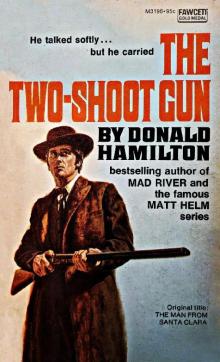 The Two-Shoot Gun
The Two-Shoot Gun Mad River
Mad River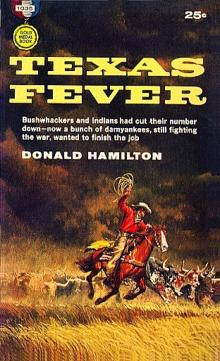 Texas Fever
Texas Fever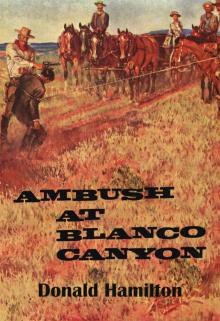 Ambush at Blanco Canyon
Ambush at Blanco Canyon The Big Country
The Big Country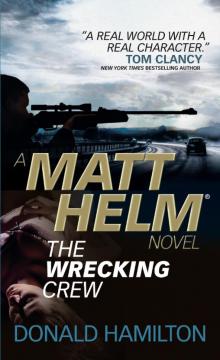 The Wrecking Crew
The Wrecking Crew The Devastators mh-9
The Devastators mh-9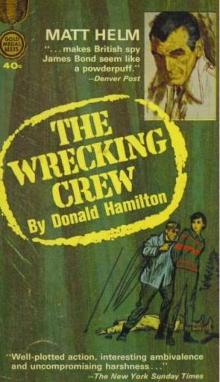 The Wrecking Crew mh-2
The Wrecking Crew mh-2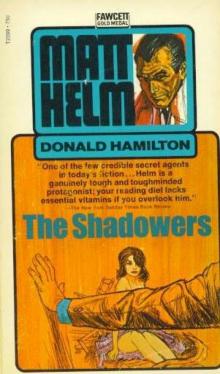 The Shadowers mh-7
The Shadowers mh-7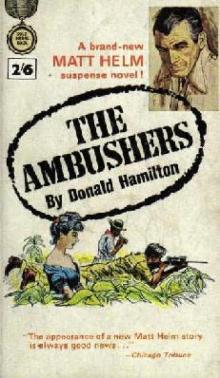 The Ambushers mh-6
The Ambushers mh-6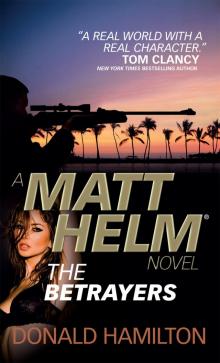 The Betrayers
The Betrayers The Terrorizers
The Terrorizers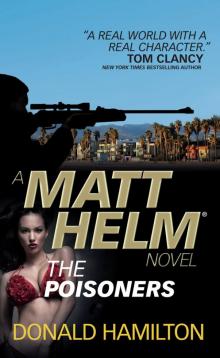 The Poisoners
The Poisoners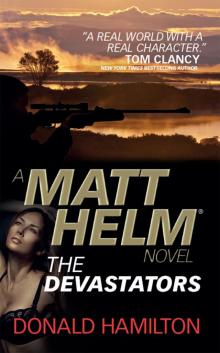 The Devastators
The Devastators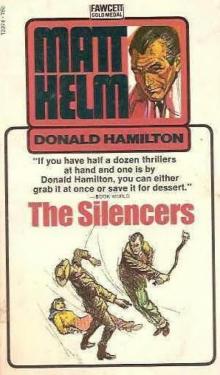 The Silencers mh-5
The Silencers mh-5 The Interlopers mh-12
The Interlopers mh-12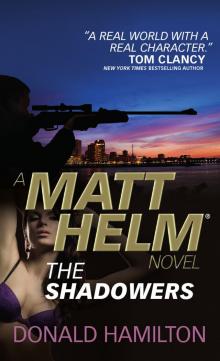 The Shadowers
The Shadowers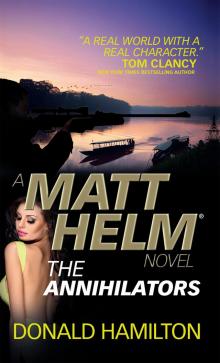 The Annihilators
The Annihilators The Vanishers
The Vanishers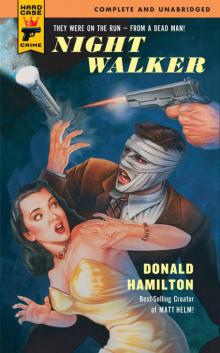 Night Walker
Night Walker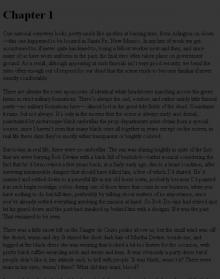 The Revengers
The Revengers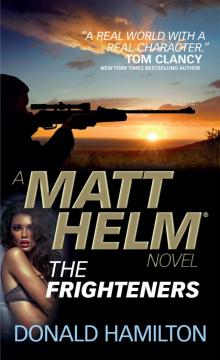 The Frighteners
The Frighteners The Infiltrators
The Infiltrators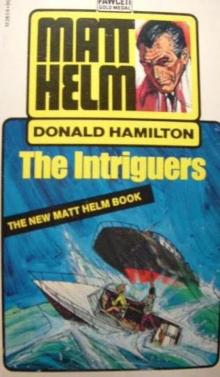 The Intriguers mh-14
The Intriguers mh-14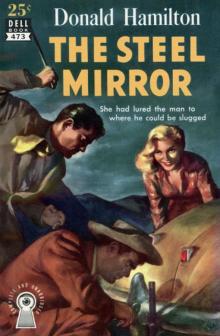 The Steel Mirror
The Steel Mirror The Menacers
The Menacers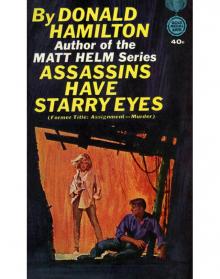 Assassins Have Starry Eyes
Assassins Have Starry Eyes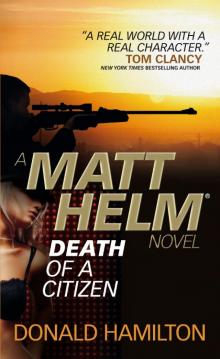 Death of a Citizen
Death of a Citizen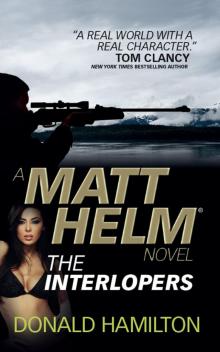 Matt Helm--The Interlopers
Matt Helm--The Interlopers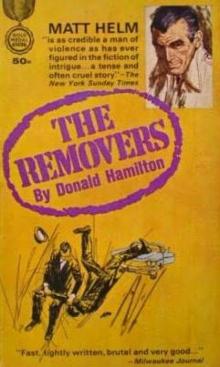 The Removers mh-3
The Removers mh-3 The Demolishers
The Demolishers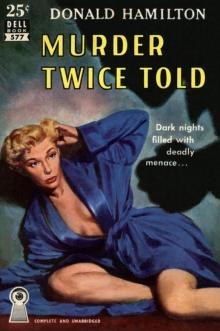 Murder Twice Told
Murder Twice Told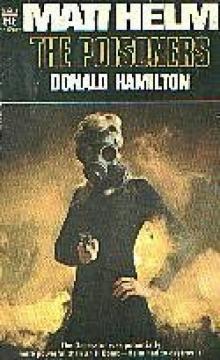 The Poisoners mh-13
The Poisoners mh-13 The Ambushers
The Ambushers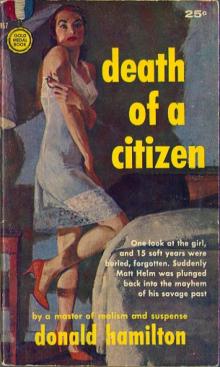 Death of a Citizen mh-1
Death of a Citizen mh-1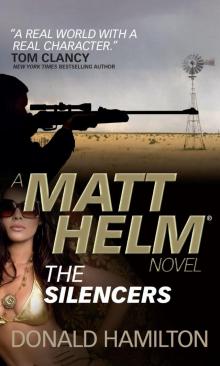 The Silencers
The Silencers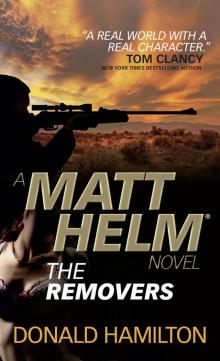 The Removers
The Removers The Intimidators
The Intimidators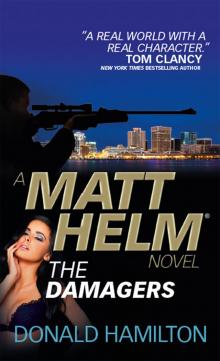 The Damagers
The Damagers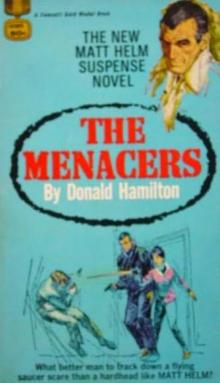 The Menacers mh-11
The Menacers mh-11 The Retaliators
The Retaliators Murderers' Row
Murderers' Row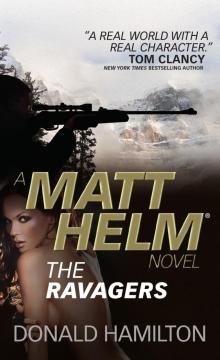 The Ravagers
The Ravagers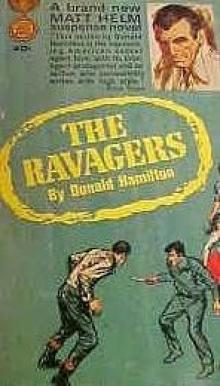 The Ravagers mh-8
The Ravagers mh-8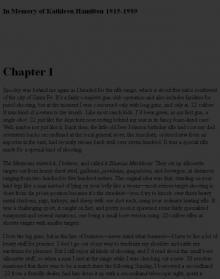 The Threateners
The Threateners The Betrayers mh-10
The Betrayers mh-10